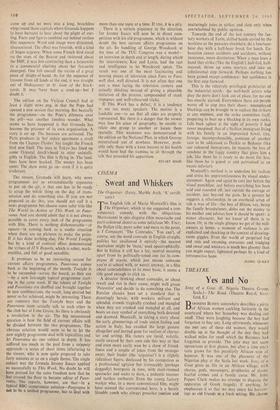CINEMA
, Sweat and Whiskers The Organiser. (Jacey, Marble Arch, 'A' certifi- cate.) THE English title of Marie Monicelli's film is The Organiser, which to me suggested a con- temporary comedy, with the ubiquitious Mastroianni in spiv disguise (thin moustache and parti-coloured shoes) as some nefarious Mr. Fixit; the Italian title, more sober and-more to the point, is I Compagni, 'The Comrades.' You can't, of course, use the word comrade in English straight, politics has swallowed it entirely--the nearest equivalent might be 'mate,' used apostrophically. But in Italian it still has a lay, neutral meaning apart from its politically-toned one (as in coin- pagno di scuola, which just means someone you're at school with, or were); anyway, in a film about comradeliness at its most basic, it seems a title good enough to stick to.
A director thinking about comrades, or about revolt and riot in their cause, might Well groan 'Potemkin' and decide to do something else. The Russian classics have set a standard that is dauntingly heroic, with workers militant and splendid, crowds tragically crushed and mangled when they are crushed and mangled at all, and boots an easy symbol of everything both detested and doomed. Monicelli, in taking a story about the early glimmerings of trade union feeling and action in Italy, has avoided the large gesture altogether and instead gone for realism of charac- ter and setting. His rioters are timid, volatile, easily swayed by their own side this way or that and even more easily won by a show of friend- liness and a couple of jokes from the manage- ment; their leader (the 'organiser') is a slightly ridiculous figure, declassed by his occupation as a professional agitator but irrevocably (perhaps doggedly) bourgeois in tone, With steel-rimmed spectacles and socks to darn, a pedantic manner and tactless outbursts. Even the young factory worker who, in a more conventional film, might have seemed the conventional hero, is a barely likeable youth who always preaches Caution and
mutteringly joins in strikes and riots only when overwhelmed by public opinion.
Towards the end of the last century the fac- tory workers of Turin, skilled hands envied by the workless or the peasants elsewhere, do a fourteen- hOur day with a half-hour break for lunch. Ex- haustion causes accidents and accidents, without insurance, mean destitution: When a man loses a hand' they strike ('like the English'), half-fail, half- succeed, throw up some martyrs and take an infinitesimal step forward. Perhaps nothing has been gained except confidence: but confidence is the first step forward.
This is the relatively privileged proletariat of the industrial north : the well-built actors who play the parts don't look out of place, for no one has exactly starved. Everywhere there are-people worse off to step into their shoes: unemployed blacklegs can be brought in to replace the, strikers at any moment, and the strike committee itself, preparing to beat up a blackleg in its own ranks, falls back aghast at the sight of poverty it had never imagined, that of a Sicilian immigeant living with his family in an improvised hovel, tiny, foreign, incomprehensible, someone of another race to be addressed as Darkie or Bedouin (like our Coloured immigrants, he mourns the loss of sunshine in the foggy country that gives him -a job, like them he is ready to do more for less, like them he is gaped at and patronised as an 'exotic inferior).
Monicelli's method is to underline his realism and stress his unpretentiousness by visual under- statement. Again and again he cuts just before the visual punchline, just before everything has been said and rounded off, just outside the outrage or accident, just beyond the pain. In a gesture he suggests a, relationship, in an overhead scrap of talk a way of life—the boy of fifteen, say, being the family breadwinner, doles out the money to his mother and advises how it should be spent: a minor character, but we know' all there. is to know. Or, in the single glimpse we get of the mill- owners at home, a moment of violence is un- explained and shocking in the context of drawing- room giggles. Even the world of perpetual fog and rain and steaming overcoats and trudging and 'sweat and whiskers is much less gloomy than you might expect, lightened perhaps by a kind of retrospective hope.
ISABEL %WILY


































 Previous page
Previous page